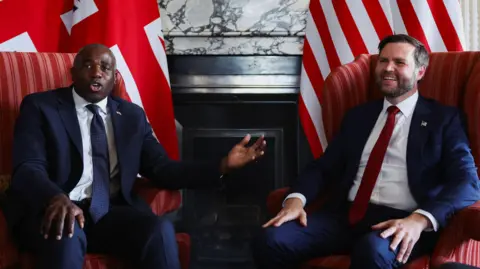In a significant development in international diplomacy, U.S. Vice-President JD Vance and UK Foreign Secretary David Lammy convene a crucial meeting of high-ranking security officials in the vicinity of London. The focal point of the discussion is the ongoing war in Ukraine, a conflict that has escalated following Russia’s full-scale invasion in February 2022. This gathering sets the stage for key deliberations occurring ahead of a pivotal summit between U.S. President Donald Trump and Russian President Vladimir Putin scheduled for the following week.
The importance of this meeting cannot be overstated, as it comes in the wake of a strategic conversation between UK Prime Minister Keir Starmer and Ukrainian President Volodymyr Zelensky. Starmer underscored the necessity of this forum, emphasizing its role in facilitating dialogue aimed at advancing peace in what has become a protracted conflict. Zelensky’s position remains firm; he has made it unequivocally clear that Ukraine will not entertain any territorial concessions to Russia, a stance that clashes with Trump’s earlier insinuations that Ukraine might need to cede territory to resolve the conflict.
The meeting is set to unfold at Chevening, the official country residence of Lammy, situated in Kent. Various senior security officials from the U.S., Ukraine, and other European nations are expected to participate, indicating a broad spectrum of diplomatic involvement in seeking solutions to the war. There is wide recognition that any meaningful resolution must account for Ukraine’s sovereignty and territorial integrity.
As discussions proceed, the backdrop of Trump’s scheduled meeting with Putin on August 15 in Alaska looms large. Trump has indicated a willingness to explore territorial arrangements between Ukraine and Russia, suggesting potential “swapping” of territories that could benefit both parties. While he characterized the conflict as one where numerous lives have been lost, the implications of his comments raise substantial concerns in Kyiv. Trump’s proposals suggest a possible compromise that may disregard Ukrainian interests.
Zelensky has taken a proactive stance against these sentiments. In a statement issued via Telegram on Saturday, he reiterated that “Ukrainians will not give their land to the occupier,” and emphasized the imperative of including Ukraine in any peace negotiations. Such assertions reflect deep-rooted apprehensions among Ukrainians and their allies regarding the potential for a deal to be struck that excludes them from crucial discussions.
Furthermore, the dialogue from European leaders continues to emphasize that Ukraine’s future should not be determined without its direct participation. French President Emmanuel Macron highlighted the indivisibility of Ukrainian sovereignty and European security, asserting that Europe’s own stability is likewise contingent on the outcome of the Ukraine crisis. His remarks can be seen as a call for solidarity among European nations, underscoring the collective security interests at stake.
However, the sentiments on the ground portray a mix of frustration and hope among Ukrainian soldiers and civilians amidst an ongoing siege and assault. While there is a pervasive weariness from sustained military confrontations and relentless airstrikes, the overarching sentiment remains one of resilience. Ukrainians are resolute in prioritizing their sovereignty over seeking peace at any price.
Given the convoluted dynamics of these negotiations, many remain skeptical about the likelihood of a concrete resolution that reflects Ukraine’s interests. On the diplomatic front, the U.S. administration’s actions will be scrutinized closely, particularly in light of reports indicating a potential lack of substantive measures following Trump’s ultimatum for Russia to negotiate a ceasefire.
In summary, the meeting led by Vance and Lammy represents a vital step in addressing one of the most critical geopolitical crises of our time. As key players prepare for discussions that could shape the course of the war in Ukraine, the imperative remains: any path to peace must include the voices of those most affected.











